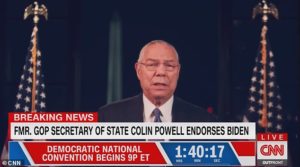 It looks like the Corporate Democrats haven’t gotten the message based on their highly visible parading of Bush Republicans and neocons at the DNC virtual convention.
It looks like the Corporate Democrats haven’t gotten the message based on their highly visible parading of Bush Republicans and neocons at the DNC virtual convention.
At The National Interest:
Why Americans Want a President Who Ends Endless Wars
 A new poll shows that the U.S. public supports a more realist foreign policy and wants its leaders to focus more on pressing domestic needs than overseas projects.
A new poll shows that the U.S. public supports a more realist foreign policy and wants its leaders to focus more on pressing domestic needs than overseas projects.
The United States has been an active military player around the globe since the end of the Cold War. It has fought bloody and expensive wars in Iraq and Afghanistan while also conducting significant military operations in the Balkans, Libya, Syria, and other hot spots in the Middle East and North Africa.
The election of Donald Trump and the significant support garnered by Bernie Sanders and Elizabeth Warren in the Democrat primary suggests that Americans have become weary of this heavy burden. These elected officials prominently called for new thinking about America’s role in the world and benefited from it.
A new YouGov poll commissioned by the Charles Koch Institute provides further evidence that the American public supports a more realist foreign policy and wants its leaders to focus more on pressing domestic needs than overseas projects. YouGov interviewed two thousand people from July 24–27, 2020, and compiled the poll data based on their responses. Given how polarized the country is on so many other issues, it is particularly striking how unified Americans are in ending our endless wars in the Middle East and avoiding greater military entanglement in conflicts overseas.
Focus on Challenges at Home
Americans regardless of party want their leaders to focus their attention on the home front rather than abroad. Overall, 75 percent of Americans agreed with the statement, “The United States should prioritize domestic issues over foreign policy issues” while only 6 percent want the United States to prioritize foreign policy issues over domestic issues. A whopping 82 percent of Republicans agreed with the first statement and only 4 percent of those who identified with the GOP wanted to prioritize foreign policy issues. The split amongst Democrats was only slightly less skewed, at 75 percent versus 6 percent.
When it comes to the issue of U.S. military engagement in conflicts around the world, Americans again tended to favor greater caution. Nearly half—48 percent—believe the United States should be less militarily engaged in conflicts around the world with only 7 percent wanting more military engagement. There appears to be little stomach for continuing military adventurism.
Ending Endless Wars
America’s realist turn is especially notable in how the public is thinking about our long-standing wars in Iraq and Afghanistan. About 74 percent of Americans support bringing U.S. troops home from Iraq with only 11 percent opposing such a move. Support for military withdrawal from Afghanistan is even higher, with 76 percent of Americans favoring bringing U.S. troops home from Afghanistan and only 10 percent opposing withdrawal. Nearly half of Americans “strongly support” withdrawing troops from that country, suggesting that President Trump and Ambassador Zalmay Khalilzad have the political winds at their back in their efforts to end this endless war.
In the face of increased polarization and so many 50/50 splits in the electorate, it is noteworthy that support for withdrawal from Afghanistan has substantially increased over the last two years. In March of 2018, 50 percent of Americans supported decreasing (26 percent) or fully removing (24 percent) U.S. troops from Afghanistan with 16 percent favoring an increase and 19% supporting maintaining the same number of troops. By the beginning of 2019, 51 percent of Americans continued to say they would support the decision to remove U.S. troops from Afghanistan within the year with only 22 percent responding that they would oppose this decision and 27 percent unsure. By January of 2020, 69 percent of Americans supported bringing U.S. troops home from Afghanistan compared to 14 percent opposed. Today, as noted above, the number of Americans who favor bringing U.S. troops home from Afghanistan stands at 76 percent. Although the questions had slightly different framing, the answers show the same trend—support for withdrawal from Afghanistan has consistently risen.





